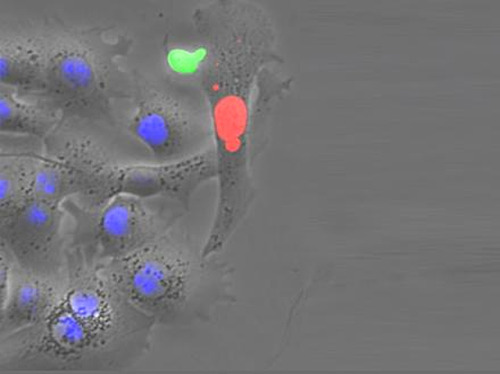
Hepatitis B-gone
Although infection with the hepatitis B virus (HBV), which can cause severe liver disease and even cancer, is preventable with a vaccination, it’s estimated that more than 260 million people worldwide are chronically infected. And, for such individuals there’s currently no cure. That may be set to change however, if the results of a recent mouse experiment hold true in humans. Humanized mice – containing HBV-infected human liver cells – have been treated with a combination of an antiviral drug and human T cells engineered to express specific anti-HBV receptors. The tooled-up T cells have increased power for killing HBV-infected cells. Indeed, such a T-cell (in green) is shown here attacking a cell expressing HBV proteins (red), while uninfected cells (blue) remain unharmed. Importantly, this approach successfully cleared the mice of their infection, providing hope that such T-cells may also eliminate the disease and associated cancer risk in patients.
Tomorrow, 28th July, is World Hepatitis Day
Written by Ruth Williams
- Image by Jochen Wettengel, Helmholtz Zentrum München
- Institute of Virology, Helmholtz Zentrum München, Munich, Germany
- Image copyright held by Helmholtz Zentrum München
- Research published in Journal of Clinical Investigation, July 2019
You can also follow BPoD on Instagram, Twitter and Facebook
Archive link







Комментариев нет:
Отправить комментарий